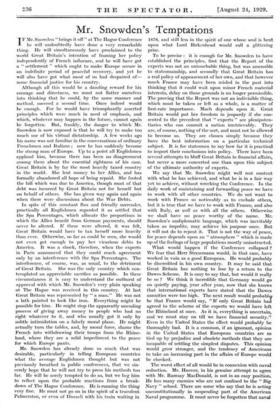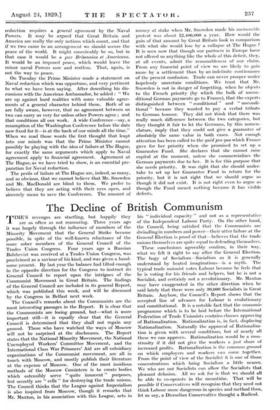Mr. Snowden's Temptations
IF Mr. Snowden "brings it off" at The Hague Conference he will undoubtedly have done a very remarkable thing. He will simultaneously have proclaimed to the world Great Britain's intention of framing her policy independently of French influence, and he will have got a " settlement " which ought to make Europe secure in an indefinite period of peaceful recovery, and yet he will also have got what most of us had despaired of— some financial justice for his country.
Although all this would be a dazzling reward for his courage and directness, we must not flatter ourselves into thinking that he could, by the same manner and method, succeed a second time. Once indeed would be enough. For he would have triumphantly asserted principles which were much in need of emphasis, and which, whatever may happen in the future, cannot again be forgotten. But, frankly, the danger to which Mr. Snowden is now exposed is that he will try to make too much use of his virtual dictatorship. A few weeks ago his name was not familiar in the conversations of ordinary Frenchmen and Italians ; now he has suddenly become the strong man of Europe. Up to a point all Englishmen applaud him, because there has been no disagreement among them about the essential rightness of his case. Great Britain is by far the most heavily taxed country in the world. She lent money to her Allies, and has formally abandoned all hope of being repaid. She footed the bill which was due to America, though most of that debt was incurred by Great Britain not for herself but on behalf of others. She has given way again and again when there were discussions about the War Debts.
In spite of this constant flux and friendly surrender, practically all Englishmen regarded it as settled that the Spa Percentages, which allocate the proportions in which the Allies benefit from German payments, should never be altered. If these were altered, it was felt, Great Britain would have to tax herself more heavily than ever. Otherwise, so far as could be seen, she would not even get enough to pay her vicarious debts to America. It was a shock, therefore, when the experts in Paris announced that they could reach agreement only by an interference with the Spa Percentages. The interference, of course, was, as usual, to the detriment of Great Britain. She was the only country which con- templated an appreciable sacrifice as possible. In these circumstances it is easy to understand the outburst of approval with which Mr. Snowden's very plain speaking at The Hague was received in this country. At last Great Britain was represented by "a man." He was not a lath painted to look like iron. Everything might be possible for him. He might stop the apparently unending process of giving away money to people who had no right whatever to it, and who usually got it only by subtle intimidation on a falsely moral plane. He might actually turn the tables, and, by moral force, shame the French into withdrawing their troops from the Rhine- land, where they are a solid impediment to the peace for which Europe pants.
Mr. Snowden has already done so much that was desirable, particularly in telling European countries what the average Englishmen thought but was not previously breathed in public conferences, that we sin- cerely hope that he will not try to press his methods too far. He will be sorely tempted to do so, but we beg him to reflect upon the probable reactions from a break- down of The Hague Conference. He is running the thing very fine. He must not go on in the spirit of a truculent Palmerston, or even of Disraeli with his train waiting in 1878, and still less in the spirit of one whose soul is bent upon what Lord Birkenhead would call a glittering prize.
To be precise : it is -enough for Mr. Snowden to have established the principles, first that the Report of the experts was not an untouchable thing, but was amenable to statesmanship, and secondly that Great Britain has a real policy of appeasement of her own, and that however much France may have been misled in the past into thinking that it could wait upon minor French material interests, delay on those grounds is no longer permissible. The proving that the Report was not an indivisible thing, which must be taken or left as a whole, is a matter of first-rate importance. Much depends upon it. Great Britain would put her freedom in jeopardy if she con- sented to the precedent that " experts " are plenipoten- tiaries who can commit a nation irretrievably. They are, of course, nothing of the sort, and must not be allowed to become so. They are chosen simply because they have the best information on a particular technical subject. It is for statesmen to say how far it is practical to import their conclusions into policy. There have been several attempts to bluff Great Britain in financial affairs, but never a more concerted one than upon this subject of the ultimate authority of experts.
We say that Mr. Snowden might well rest content with what he has achieved, and what he is in a fair way yet to achieve, without wrecking the Conference. In the daily work of maintaining and forwarding peace we have to work with all other countries. We do not want to work with France so noticeably as to exclude others, but it is true that we have to work• with France, and also with Italy, as well as with all the others. Otherwise we shall have no peace worthy of the name. Mr. Snowden's undiplomatic language, which was inevitably taken as impolite, may achieve his purpose once. But it will not do to repeat it. That is not the way of peace, for peace depends upon an " atmosphere " which is made up of the feelings of large populations mostly uninstructed.
What would happen if the Conference collapsed ? We fear that Herr Stresemann would, in that case, have worked in vain as a good European. He would probably be discredited in his own country. It may be said that Great Britain has nothing to lose by a return to the Dawes Scheme. It is easy to say that, but would it really be so ? We think it incredible that Germany would go on quietly paying, year after year, now that she knows that international experts have stated that the Dawes annuities were too high. The next result would probably be that France would say, "If only Great Britain had agreed to the scheme of the experts we would have left the Rhineland at once. As it is, everything is uncertain, and we must stay on till we have financial security.'! Even in the United States the effect would probably be thoroughly bad. It is a common, if an ignorant, opinion in the United States that European countries are so tied up by prejudice and obsolete methods that they are incapable of settling the simplest disputes. This opinion would grow stronger, and the tendency of Americans to take an increasing part in the affairs of Europe would be checked.
The worst effect of all would be in connexion with naval reduction. Mr. Hoover, in his genuine attempt to agree with Mr. Ramsay MacDonald, is not in an easy position: He has many enemies who are not confined to the "Big Navy" school. There are some who say that he is acting unconstitutionally in suspending part of the American Naval programme. It must never be forgotten that naval reduction requires a general agreement by the Naval Powers. It may be argued that Great Britain and America are really the only nations which count, and that if we two came to an arrangement we should secure the peace of the world. It might conceivably be so, but in that case it would be a pax Britannica et Americana. It would be an imposed peace, which would leave the minor naval Powers sore and restless. That, again, is not the way to peace.
On Tuesday the Prime Minister made a statement on Naval reduction which was opportune, and very pertinent to what we have been saying. After describing his dis- cussions with the American Ambassador, he added : "We are up against hard realities with some valuable agree- ments of a general character behind them. Both of us are fully aware, however, that no agreement between us two can carry us very far unless other Powers agree ; and that conditions all our work. A wide Conference—say, a resumption of the Washington Conference before the date now fixed for it—is at the back of our minds all the time." When we read those words the first thought that leapt into our minds was that the Prime Minister cannot possibly be playing with the idea of failure at The Hague, for exactly the same arguments which apply to Naval agreement apply to financial agreement. Agreement at The Hague, as we have tried to show, is an essential pre- paration for Naval reduction.
The perils of failure at The Hague are, indeed, so many, and so obvious, that we cannot believe that Mr. Snowden and Mr. MacDonald are blind to them. We prefer to believe that they are acting with their eyes open, and sincerely mean to save the Conference. The amount of money at stake when Mr. Snowden made his memorable protest was about 22,400,000 a year. How would the gain of that amount by Great Britain look in comparison with what she would lose by a collapse at The Hague ? It is seen now that though our partners in Europe have not offered us anything like the whole of this deficit, they, at all events, admit the reasonableness of our claim. From any financial point of view we are likely to gain more by a settlement than by an indefinite continuance of the present confusion. Trade can never prosper under hopelessly uncertain conditions. We trust that Mr. Snowden is not in danger of forgetting, when he objects to the French priority (by which the bulk of uncon- ditional German payments go to France), that the experts distinguished between " conditional " and " uncondi- tional " because they wanted to pay a verbal tribute to German honour. They did not think that there was really much difference between the two categories, but they thought it fair to let the Germans, by this nomen- clature, imply that they could not give a guarantee of absolutely the same value in both cases. Not enough attention has been called to the quid pro quo which France gave for her priority when she promised to set up a Guarantee Fund. She declares that she cannot raise capital at the moment, unless she commercializes the German payments due to her. It is for this purpose that she needs priority. It was right that she should under- take to set up her Guarantee Fund in return for the priority, but it is not right that we should argue as though it did not exist. It is not right even to argue as though the Fund meant nothing because it has visible defects.































 Previous page
Previous page